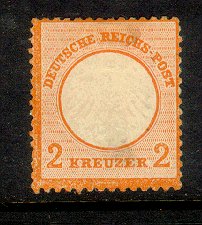
Deutschland - Allemagne - Duitsland - Alemania
Return To Catalogue -
1870-1874 issues - 1875-1888
issues - 1889-1899 issues - 1900-1920 'Germania' - 1900-1920
other issues - 1921-1923 inflation
period, part 1 - 1921-1923 inflation
period, part 2 - 1924-1935 issues - 1936-1945 issues - 1945-1948
'Bizone' - 1945 French Occupation Zone
- Germany (West) and Berlin - Airmal - Military
stamps - Official stamps - German States - German
colonies - Miscellaneous
Danzig - Saar
1920-1935 and miscellaneous - Saar
1947-1959
Currency: 30 Groschen = 1 Taler
(northern part of Germany) 60 Kreuzer = 1 Gulden (southern part
of Germany)
1875: 100 Pfennig = 1 Mark
Note: on my website many of the
pictures can not be seen! They are of course present in the cd's;
contact me if you want to purchase them: evert@klaseboer.com.
Before 1870 Germany consisted of several states;
four kingdoms: Prussia, Bavaria, Saxony and
Wurtemberg;
six grand-duchies: Baden, Hesse,
Mecklenburg-Schwerin, Saxe-Weimar, Mecklenburg-Strelitz,
Oldenburg;
five duchies: Brunswick, Saxe-Meiningen,
Saxe-Altenburg, Saxe-Coburg-Gotha, Anhalt;
seven principalities:
Schwartzburg-Sondershausen, Schwartzburg-Rudolstadt, Waldeck,
Reuss-Greiz, Reuss-Schleitz, Schaumburg-Lippe, Lippe-Detmold;
three free towns: Lubeck, Bremen, Hamburg
and one 'Reichsland': Alsace-Lorraine.
Many of them issued their own stamps. For a more extensive
history of Germany see 'Germany and it Colonies'
by Bertram W.H.Poole. In 1870 Germany was united and only Bavaria and Wurttemberg
continued issuing their own stamps. The currency in the northern
part and the southern part was different, therefore we can find
stamps of the first issue in 'Kreuzer' or in 'Groschen'. In 1875
the 'Mark' was introduced (1 Mark = 100 Pfennig). Stamps of
Germany have as inscription 'Deutsche Reichs-Post', 'Reichspost'
or 'Deutsches Reich'. After the second world war the stamps of Western Germany have the inscription
'Deutsche Bundespost' and the stamps of the German Democratic
Rebublic 'Deutsche Demokratische Republik'. After the
re-unification of both Germanies in 1990, the inscription is
'Deutschland'. Berlin, which was
surrounded by the German Democratic Republic, but was part of
Western Germany, issued its own stamps from 1948 to 3rd October
1990 (date of reunification).
1870-1874 issues, inscription 'Deutsche Reichs Post', example:
The value of these stamps was in 'Groschen' (northern part of Germany) or 'Kreuzer' (southern part of Germany).
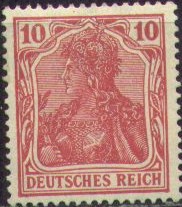
(So-called Germania issue)
Many values were issued in this 'Germania' type, click here for more information.
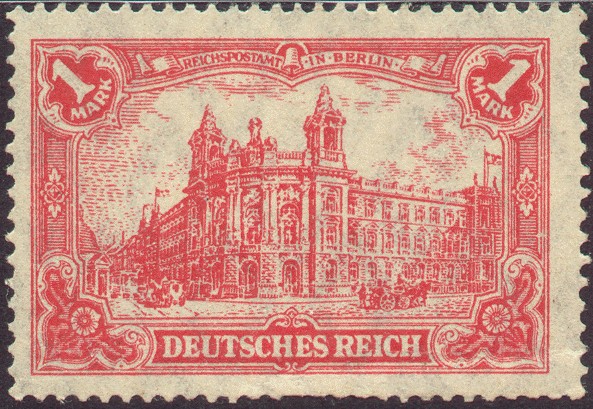
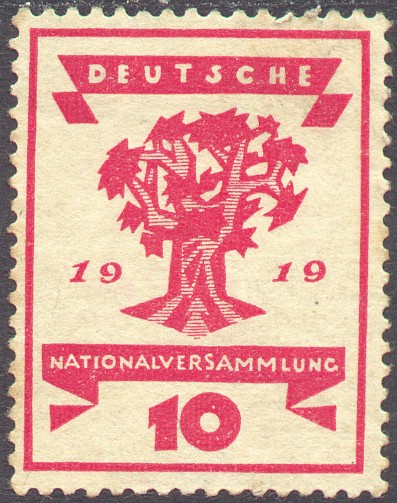
(Other issues from 1900 to 1920)
Click here to see the other issues of Germany from 1900 to 1920.
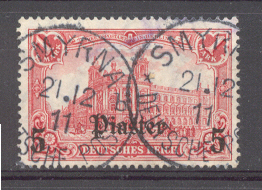
(Example of a German stamp, overprinted '5 Piaster 5' to be used
in Turkey)
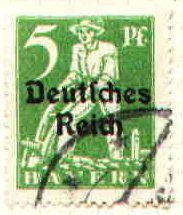
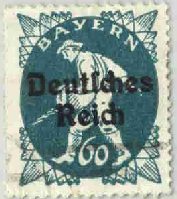
These stamps were printed after the incorporation of Bavaria in the German Empire. They were valid in whole Germany, but were almost only used in Bavaria itself. Click here for more information.
An interesting period in the German philately is the inflation period of 1921-1923. Click here: Germany 1921-1923 inflation period, part 1, part 2 or part 3 for more information.
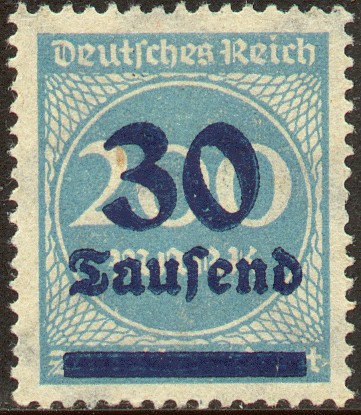
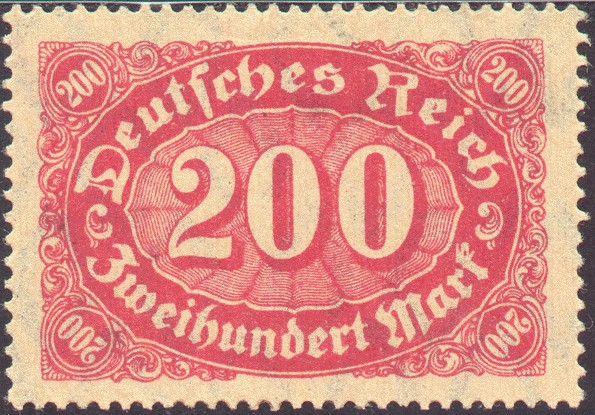
(Some examples of the inflation period)
Some examples of this period:
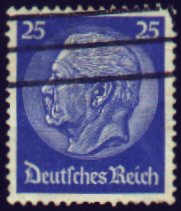
1931 issue
Example:
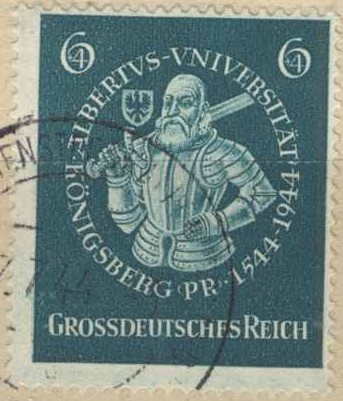
Inscription 'GROSSDEUTSCHES REICH'
Click here for stamps of Germany ssued from 1936 to 1945.
After the end of World War II, the American and British occupational zones were joined to form the so-called Bizone. The Russian and French zones issued their own stamps. Click here for stamps issued during this 1945-1948 'Bizone'. The stamps issued during this period have inscription 'DEUTSCHE POST' or 'AM POST DEUTSCHLAND'.
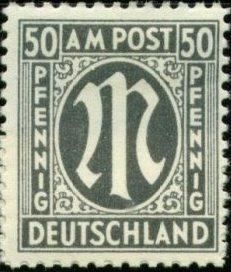
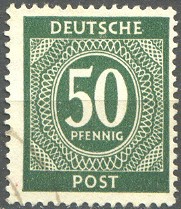
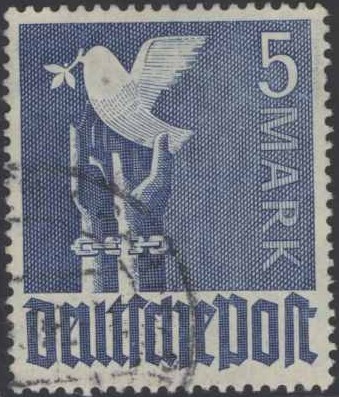
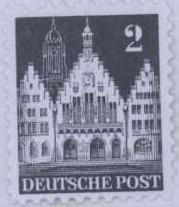
Some examples of stamps issued during this period.
Click here for Germany (West) and Berlin stamps issued after World War II.
In 1945 stamps were issued in the French occupation zone of Germany, special stamps with inscription 'BADEN', 'WURTTEMBERG' and 'RHEINLAND PFALZ' (Rhine Palatinate) were issued as well as a general issue.
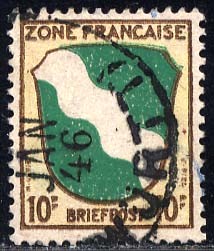

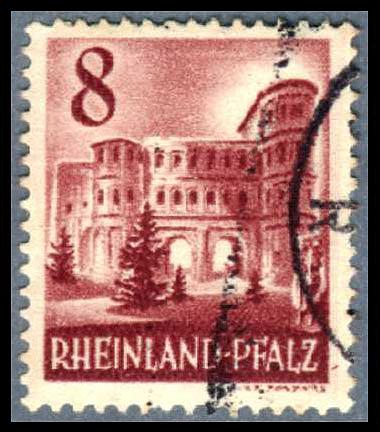
Some examples of issues of this period.
Click on Germany 1945 French Occupation Zone for more information
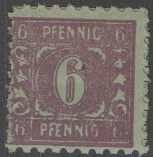
Example of a 1945 local issues for the
Russian occupation zone
On Berlin bear issues 5 p green 6 p violet 8 p orange 10 p brown 12 p red 20 p blue 30 p green On 1946 numeral design 5 p green 30 p olive 45 p red 75 p blue 84 p green On 1947 Bizone issue
2 p black 6 p violet 8 p red 10 p green 12 p grey 15 p brown 16 p green 20 p blue 24 p brown 25 p yellow 30 p red 40 p lilac 50 p blue 60 p brown 80 p blue 84 p green
12 p + 8 p blue (inscription 1949) 16 p + 9 p brown (incription 1948) 24 p + 16 p lilac (inscription 1949) 30 p + 15 p red (inscription 1949) 50 p + 25 p blue (inscription 1948) 50 p + 25 p blue (inscription 1949)
2 p grey (Kathe Kollwitz) 6 p violet (Gerhardt Hauptmann) 8 p brown (Karl Marx) 10 p green (August Bebel) 12 p blue (Friedr. Engels) 15 p black (G.W.Fr. Hegel) 16 p blue 20 p brown (Kathe Kollwitz) 24 p red (Ernst Thalmann) 25 p green 30 p orange (Friedr. Engels) 40 p lilac (Gerhardt Hautpmann) 50 p blue (Karl Marx) 60 p green (G.W.Fr. Hegel) 80 p blue (Ernst Thalmann) 84 p brown (August Bebel)
12 p + 5 p red
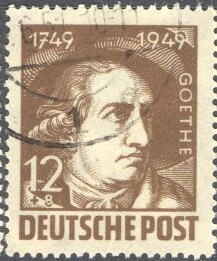
6 p + 4 p violet 12 p + 8 p dark brown 24 p + 16 p red 50 p + 25 p blue 84 p + 36 p green
24 p red
24 p red Overprinted '3.Deutscher Volkskongress 29.-30.Mai 1949' 24 p red
12 p + 3 p black
Usually this stamp is perforated, but I've seen it imperforate in a minisheet together with an imperforate stamp day 1950 stamp, issued for the 'DEUTSCHE BRIEFMARKENAUSSTELLUNG - LEIPZIG 26 . 8 . - 3 . 9 . 1950'.
50 p blue
12 p blue 30 p red
Another example:
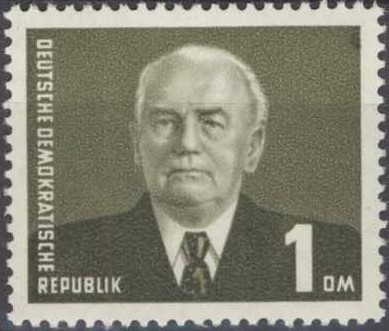
Inscription 'DEUTSCHE DEMOKRATISCHE REPUBLIK'
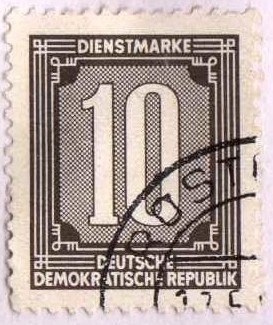
Official stamp, 'DIENSTMARKE DEUTSCHE DEMOKRATISCHE REPUBLIK'
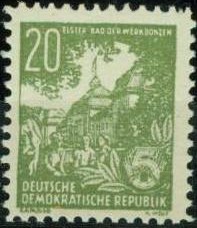
Propaganda forgery, inscription 'ELSTER BAD DER WERKBONZEN'
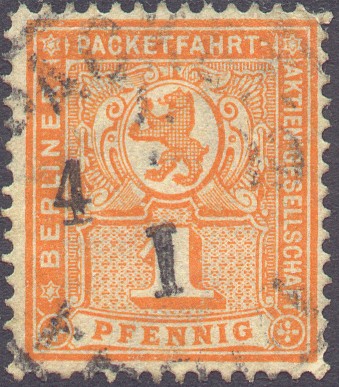

(Berlin, 19th century local issue and West-Saxony 1945 issue)
In Germany, during the 19th century many local issues were issue, click here for an overview. After world war II many local stamps were issued again, see: Germany 1945 local issues, part 1 or Germany 1945 local issues, part 2 for more information. I've tried to list most of the 19th century locals and many of the 1945 locals.
Abart = variety
Abbildung = illustration
abgenutzt = worn (for plates)
Abklatsch = parts of stamp image visible on the backside
ablösen = soak off
abnützung = wear
Absender = sender
Abstand = distance
Abstimmung = plebiscite
Abweichung = variety
ähnlich = similar
Albumblatt = album page
allseitig = on all sides
amtlich = official
Ankunft = arrival
Antwort = reply
Attest = certificate
Aufdruck = overprint
Auflage = number of stamp issued
ausland = foreign
Ausschnitt = cut square
Bahnpost = railway postage
Balkenstempel = bar cancel
Bayern = Bavaria
beschädigt = damaged
beschnitten = cut into design
bezahlt = paid
Bild = image
blass = pale
Bogen = sheet
breit, breitrandig = wide (margin of stamp)
Brief = letter
Briefkarte = postcard
Briefmarke = stamp
Briefumschlag = envelope
Brustschild = name of first stamps of German Empire)
Bundespost = federal German post
Deutschland = Germany
Dienst = official
Dienstmarke = official stamp
Doppeldruck = doubly printed
Druck = print
Druckfehler = misprint
dünn = thin
dünne Stelle = thinned part
Entwertung = cancel
falsch = forged
Fälschung = forgery
Fälschung zum Schaden der Post = postal forgery
Falz = hinge
Farbe = colour
Fehldruck = error
Ganzfälschung = total forgery (paper, image and cancel are
forged)
Ganzsache = postal stationery
Ganzsachenausschnitt = cut from postal stationery
gebracht = used
gebühr bezahlt = postage paid
gefälligkeitsstempel = cancelled to order
gefälscht = forged
geprüft = expertized
gerissen = torn
Germania = name of stamps issued from 1900 onwards with image of
a woman
geschnitten = imperforate
gestempelt = obliterated, cancelled
gezähnt = perforated
Groschen = currency unit
Gummierung, Gummi = gum
halbiert = bisected
infla = stamps from the inflation period
Katalog = catalogue
Katalogwert = catalogue value
kopfstehend = inverted
Kreuzer = currency unit
Lückenfüller = spacefiller
Machwerk or Mache = bogus stamp
Makalatur = made only for philatelists
Mängel = damage
mangelhaft = faulty
Nachdruck = reprint
Nachporto Marken = postage due stamps
Neudruck = reprint
ohne Obligo = sold as is
postfrisch = unused
Postkarte = post card
Privatmache = bogus issue
Probedruck, Probe = proof
Reich = empire
repariert = repaired
Riss = tear
Sammler = collector
Sammlung = collection
Schwindelmarke = bogus stamp
Stempel = postmark (or fiscal stamp)
tatsächlich gelaufen = postally used (not for philatelic
purposes)
Trennung = separation
ungebraucht = unused
ungezähnt = imperforated
unverausgabt = non issued
Vorläufer = colonial cancellation on ordinary German stamp
Wasserzeichen = watermark
Zahl = figure of value
Zähnung = perforation